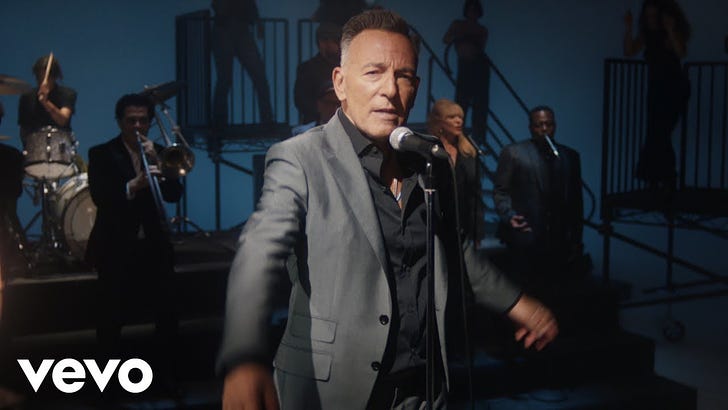In 1973, I went to see Jerry Butler sing at the Copacabana, then the fading dowager of big time, big spending New York nightlife. (I reviewed the show, and interviewed Butler, for the April 1973 issue of Creem.) But from 1941 through the 1960s, the Copa was the place to see and be seen.
The nightclub itself was a movie star: it was a featured setting in numerous films, most memorably, perhaps, in Martin Scorsese's Goodfellas. In one famous scene, Ray Liotta (Henry Hill) is wooing his future wife, Lorraine Bracco's South Shore princess, Karen. In a long single shot, mobster Hill and Karen cut through the crowd in line outside, down the stairs and through the Copa's kitchen, to the club floor. The maitre'd immediately hauls out a table, as a team of waiters hurriedly put a tablecloth and place settings and a pair of chairs at the front of the stage for Hill and his date.
"What do you do?" she asks, wowed but skeptical by the special treatment. "I'm in construction," he replies. Mobsters were always welcome there: The partner of the original owner Monte Proser was said to be gangster Frank Costello.
For black artists, the Copa was aspirational. In 1957, after the dining room and stage were integrated, Sammy Davis Jr. was was on the receiving end of inevitable racist heckling. Mickey Mantle, Yogi Berra, and Whitey Ford, three New York Yankees stars in the audience, had an altercation with the hecklers, and, according to the New York Post, "recorded many hits."
The Supremes, at the peak of their popularity in 1965, recorded a "Live at the Copa" album. The set was dominated by standards, including "Put on a Happy Face," "Somewhere," from West Side Story, and "Rock-a-Bye Your Baby With a Dixie Melody," which Al Jolson sang in blackface in Rose of Washington Square (1939) and in several earlier performances. Awkward!
But Jerry Butler was cool with the Copa: He didn't try that hard to appease the The Man. A few tunes out of his Chicago and Philadelphia soul repertory included "Moon River," which he’d already had a hit with back in 1961, "The Look of Love," and "Close to You." It was no sweat, it was never any sweat for Jerry Butler, whose nickname was "the Iceman." The way New York soul DJ Frankie Crocker used to put it, Jerry Butler was so cool he walked around with ice cubes in his pocket that would not melt.
Not to go all McLuhan on you, but Jerry Butler was a cool medium for the songs he sang. Springsteen, as we know, tends to burn like fire. The title of Bruce Springsteen's tribute to soul music released Nov. 11, Only the Strong Survive, is the Jerry Butler song that opens the album. The other Butler song is "Hey, Western Union Man." Both are solid renditions, without any added razzamatazz.
The approach Springsteen takes is loyal to a fault. At age 72, he doesn't have to prove anything with these songs, just phrase them right, hit the notes, enjoy the process. A few of these performances are special, because I hardly remember the originals, and I think my dictionary of soul is solid.
"Nightshift," recorded by the post-Lionel Richie Commodores, was a 1985 tribute to Marvin Gaye and Jackie Wilson, both of whom died in 1984. The lyrics are a clever montage of phrases from their songs: written by Dennis Lambert, Francine Golde, and the Commodores' Walter Orange, it's haunting, literally: The "Nightshift" appears to be the time when ghosts are most likely to materialize. The song would not have been out of place with the other apparitions on Springsteen's 2020 The Promise.
"Do I Love You (Indeed I Do)" written and performed originally by Frank Wilson, is a bona fide rarity, much sought as a single by scarcity-obsessed U.K. Northern Soul fans. It may have been Frank Wilson's only vocal recording, and it's possible that Motown CEO Berry Gordy buried the 1965 single's release. But Wilson stayed on as a writer and producer for Motown, responsible for hits like the Supremes' "Love Child" and the Temptations' "All I Need."
There is no attempt to "Springsteenize" these songs and performances; the E Street Band is absent. Jon Landau is executive producer, but the yeoman work is that of producer Ron Aniello (Springsteen is co-producer) who plays all the band instruments, from drums and bass to guitar and keyboards. There are orchestrations when appropriate, and they often are. There are some soul band horn arrangements, but nothing that would remind you of the Clemons family place on saxophone in the E Street Band. And the background singers are so fine, with E Street regular Soozie Tyrell, Lisa Lowell, and Michelle Moore.
Instead, Bruce—only a singer on this album, not even a guitar player—is the servant of the songs, not a vessel of transformation. The weakest performance is Diana Ross and the Supremes' "Someday (We'll Be Together)," which in style and content is way outside what I think is Springsteen's enormous sweet spot for covers: It's too sentimental.
There are other Motown covers that Springsteen handles superbly: I'm especially fond of "7 Rooms of Gloom," the Holland-Dozier-Holland song done by the Four Tops. The H-D-H writing/production team took maximum advantage of the lusty roar of Levi Stubbs, the Tops lead singer. "7 Rooms of Gloom" is two and a half minutes of relentless pleading: desperation and abasement never sounded so appealing. When Springsteen nails that Stubbs howl, which is among the first notes of the song, you can almost hear him fighting off a laugh because it felt so good.
There's more Motown: The Temptations' "I Wish It Would Rain," and ex-Tempt Jimmy Ruffin's "What Becomes of the Broken Hearted." Both are more appealing than the Rolling Stones' Temptations takes, like "Just My Imagination," in which Jagger's affected accent makes me squirm. Springsteen now has the gravitas to sing Ben E. King's "Don't Play That Song" (a much better choice than "Stand By Me" would have been). But I have had this waking dream of Bruce singing the Drifters' "I Count the Tears" for more than half of my life, and so far, it's not happening.
Springsteen at 72 (he's 73 now) has enough rasp in his voice that holding back is good exercise for him. Tyrone Davis' "Turn Back the Hands of Time," and the William Bell twofer of "Any Other Way" followed by "I Forgot to be Your Lover," are good but unexceptional. Others love the rendition here of "The Sun Ain't Gonna Shine Anymore," recorded by the Walker Brothers before Scott Walker became a cult figure. It was written by Bob Crewe and Bob Gaudio, and I bet the Four Seasons got first dibs on it and passed. It's a song that I did not like when it was a minor U.S. hit in early 1966—I was into to the harder stuff that spring and into the summer—but it is a song I wish that I wrote. Contradictory? Not exactly.
But Dobie Gray's lesser known "Soul Days," sung here with Sam Moore of Sam & Dave, sounds like a cheerfully nostalgic Springsteen song. They make it meta with slight lyric change. When Gray sang "rollin' up their sleeves 'like they did,' " here it becomes "like Springsteen." If the shirt fits, he might as well wear it.
My expert witness, soul dance DJ Connie the Empress and her impressive collection of 45s, was co-founder of the Empire State Soul Club, whose t-shirt I've worn holes through. She is also a major Springsteen fan, so I sought her opinion. She's a little more of an enthusiast than I am, so here's her stance: "I really like Bruce's take. He isn't trying to be Black, he is truly paying homage to the music that penetrated his bones. He always did [Eddie Floyd's Memphis soul classic] 'Raise Your Hand,' and Clarence added that soulful swing, but this is Bruce letting himself get into that swing and glide . . . Soul is a music of unification and I can't think of a better person or time to remind us of who we are. A stranger in life is a friend on the dance floor and do we love this? Indeed we do!"
My summation to the jukebox jury? Only the Strong Survive is neither karaoke nor hamboning. It's just a nice soul record, for the moment when Saturday night meets Sunday morning. I don't expect to play it a lot, but I won't skip a song if it turns up on shuffle. And like so many Springsteen albums, it sounds sweet on a long car ride.




